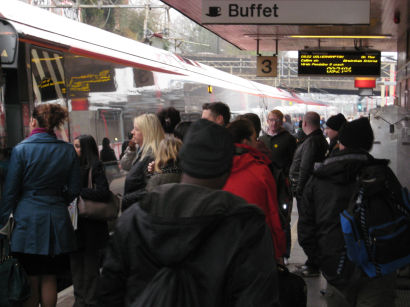THE problems facing Britain’s rail industry in coping with ever-increasing passenger demand have been starkly highlighted in Birmingham and the West Midlands where the Regional Rail Forum says that rail travel has increased so much that Network Rail’s growth forecast for 2020-21 has already been achieved — eight years early.
“In effect, since 2008-09 the West Midlands travel-to-work area rail network has seen 11 years’ forecast growth in passenger numbers (30 per cent) achieved in just four years,” the West Midlands Regional Rail Forum states in its Draft Rail Vision, ‘A World Class Rail Network for the West Midlands.’
“To some extent, the West Midlands rail network is a victim of its own success,” says the Forum, “with some routes already operating at or near capacity.
“Strong growth, over and above that predicted in industry and government forecasts, is continuing in both the regional and intercity passenger markets and also the rail freight sector. This will require urgent investment in longer/more frequent trains and additional infrastructure capability in order to meet the increasing transport demand.”
The Forum says that passenger growth in recent years has been at an average of 5.5 per cent a year, while station usage figures published by the Office of Rail Regulation on 4 April showed that passenger journeys in the Cento area in one year, 2011-12, actually increased by over 10 per cent.
Despite this, however, the Forum claims the government’s High Level Output Specification (HLOS) and the Industry Strategic Plan assumes the West Midlands will only need to cope with growth of 2.5 per cent per annum during the next Control Period (2014-19) — even though the forecast number for 2020-21 has already been reached.
Some of the Forum’s members — including Coventry City Council, Warwickshire County Council and several Warwickshire districts — are actively opposed to plans for HS2, but the Draft Rail Vision says “improved connectivity to the new HS2 stations will be essential if the transport and wider economic benefits of this significant investment in transport infrastructure are to be maximised across the wider West Midlands region.”
It says the new HS2 station in Birmingham city centre and the Interchange near Birmingham Airport “should provide the catalyst for new office, retail and housing developments, stimulating the economy and creating jobs.”
And it adds: “In order to maximize the benefits of HS2 to Solihull, Coventry and Warwickshire, and provide improved access from the north to Birmingham Airport and the NEC, the West Midlands Regional Rail Forum is calling for the majority of HS2 services between London, the North and Scotland to call at Birmingham Interchange.”
The Forum also calls for “regular direct international services from both West Midlands HS2 stations via the proposed link between HS2 and the existing HS1 route to the Channel Tunnel.”
It says ‘A World Class Rail network for the West Midlands’ (www.centro.org.uk/consultation/rail_vision.aspx) sets out a vision for the future development of rail services and infrastructure “in order to allow the regional rail network to play an even greater role in supporting future regional prosperity, higher rates of employment, including the long term structural change towards the knowledge/service economy, and, in particular, in maximising the benefits of the high speed rail network.”
• Figures recently issued by the Association of Train Operating Companies showed that in the past five years rail commuting in the West Midlands to and from Birmingham more than doubled (105 per cent), and of 14 cities with the greatest increase in rail passengers Coventry recorded the highest — with 30 per cent growth.


